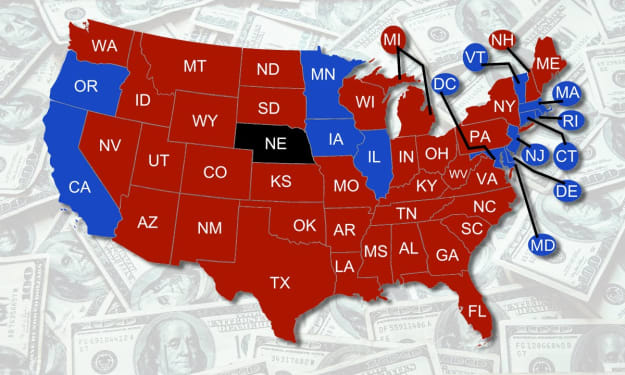Unethical Things Politicians are Doing to Keep Their Voters Supporting Them
With approval ratings at an all time low, we're wondering what unethical things politicians are doing to keep their voters supporting them.

A wise man once said that politicians need to be replaced as often as diapers - and the average voter might agree to that statement. However, it's hard to explain why congressmen still get voted in despite the approval rating of congress as a whole being at an all time low.
The fact is that most people do think they're right in voting their personal representatives and senators in - even if they don't approve of the overall performance of our government. Did you ever wonder what makes politicians win year after year? Here's the truth behind some of the sketchier voter retention choices they make.
Converting to a different religion.

One of the biggest names in the Republican party is Mike Pence - and he started off as a Catholic Democrat. However, when he switched parties, he noticed that Republicans were getting a lot more supporters in their party if they were backed by Evangelical Christians.
Like many politicians, Pence converted to Evangelical Christianity. It was his way of ensuring that he got their support and appeared unified with their political agenda. Religiously, this isn't an ethical practice, but it works.
This isn't anything new. It's even been done in the times when both Islam and Christianity gained support from kings and rulers.
Passing or pushing bills they know will fail or get repealed.

A very common tactic used by politicians who want to curry the favor of extreme groups is to try to push bills through that are way too extreme or ridiculous to actually be passable. Then, they watch as these same extreme bills get shot down - often within a matter of months.
Then, come election time, they can turn to their extremist constituents and say, "Hey, I tried to speak on your behalf, but these guys didn't let me see the bill to fruition."
The fact is that they know they weren't going to pass - that's why they push those bills. The politicians who do this never want to get those bills to turn into laws; they just waste taxpayer money trying to assuage a bunch of extremist views.
Verbally attacking opponents using name-calling, blame-shifting, or falsifying scandals.

A common tactic used by politicians that know that their platforms are shaky or are aware of how bad they look is to go on an offensive rather than a defensive position in hopes that their voters will become angry with their opponents, and therefore vote them in once more.
A good example of this would be to attack an opponent's personality or history. For example, when Obama first ran for presidents, many politicians subtly alluded to the fact that his middle name was "Hussein" as a way of saying that he's not as "American" as they were.
The reason this is unethical is because it tries to take focus away from the actual issues at hand - and it's also mean.
Clinging to virtue signaling rather than what actually works.

Virtue signaling is the act of flaunting the fact that you're "such a good person" by doing things that superficially seem to suggest a strong religious, family-centric, and moral leaning. The problem with virtue signaling is that the things people do to prove they're "good" often have no beneficial impact whatsoever.
In fact, some virtue signaling actually can be seriously detrimental to peoples' lives on a political level - and most politicians are smart enough to know this.
The most obvious issue where virtue signaling comes into play is abortion and birth control. Politicians who ban it say that it "kills babies" and that it's "wrong, even if the woman is at medical risk."
But, in reality, studies have shown that having birth control widely available and having abortions save taxpayers money, reduce unwanted children, and alleviate the already-clogged foster care system.
Politicians who are anti-choice have read these reports, but often don't care because it's not about quality of life for their voters. Rather, it's about getting voters to see them as the better person - at the cost of women's lives, taxpayer dollars, and children's futures.
Pitting groups against one another.

Some politicians have managed to get all the way up to the top of their political game by turning voters against one another. The most common ways to do this include using race as a factor, or using wealth levels as a way to get voters to choose one politician over another.
The best example of this kind of rhetoric use was with Adolf Hitler. He got to power because he said that Germans were being used by non-Germans, religious minorities, homosexuals, and "inferior people."
People voted him in because they thought Hitler would favor them and make their lives better - despite him saying that a large portion of Germany needed to be wiped out.
By the end of Hitler's power over Germany, the country ended up in ruin, millions died at the hands of an evil dictator, and people associated Germany with hatred, murder, and violence.
Sadly, people still use this tactic despite the fact that it ends up hurting everyone.
Silencing opposition.

If all else fails, the best way to keep voters voting for you is to make a point to silence anyone who speaks against you. In America, this is most often seen with edited footage that is played to bolster a politician's image. By taking out the things they said that wouldn't be popular, or by bribing people to keep their mouth shut, networks help keep politicians that serve them in power.
Of course, you can also silence opponents by killing them. This is why North Korea has no party other than the one ruled by Kim Jong-Un.
About the Creator
Cato Conroy
Cato Conroy is a Manhattan-based writer who yearns for a better world. He loves to write about politics, news reports, and interesting innovations that will impact the way we live.






Comments
There are no comments for this story
Be the first to respond and start the conversation.